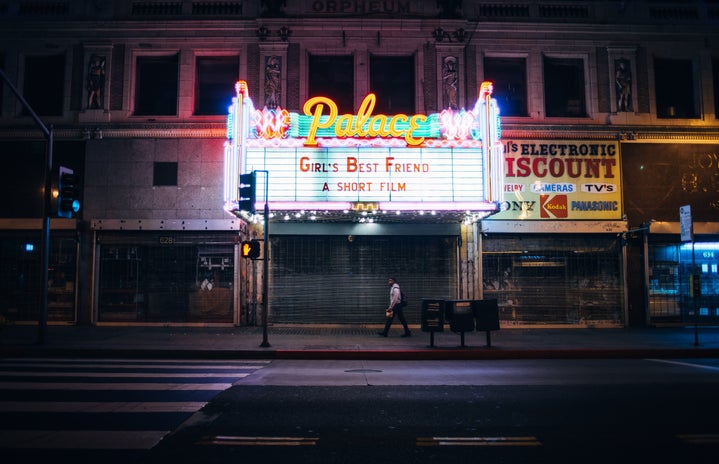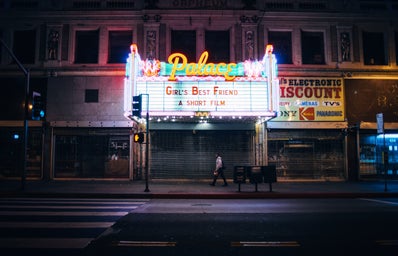The Robertson family is no stranger to the public eye. Louisiana hunters and entrepreneurs, the Robertsons were thrust into the spotlight after their reality show, Duck Dynasty, skyrocketed in popularity. Since their major breakthrough, they have spread their wings and released a variety of podcasts, appeared on multiple spin-off series, and published numerous books. Their most recent film, The Blind, just premiered on September 28th. It is based on the true story of Phil Robertson, recounting his struggle with alcoholism before finally turning his life around. The movie is meant to tell a story of redemption and encourage audience members that no one is too far for God’s grace, but is it truly as heart-warming as its message? Here’s what the film got right and what it got so so wrong.
The Good
The Blind is one of the most aesthetic films I’ve seen this year. The cinematography itself is gorgeous, the color grading is beautiful, and there are plenty of silhouette shots that could serve as perfect photographs. The set design and costume departments did a fantastic job at making everything look like it’s taking place in the sixties and seventies, and the soundtrack adds to its atmospheric nature. Its biggest editing highlights involve fast-paced montages, tight transitions that make the rising stakes of its characters’ internal battles palpable.
Although it’s stylistically gorgeous, the stripped-back scenes in this film are where it truly shines. The scenes that showcase minimal dialogue, leaving just the camera and actors releasing pure, raw emotion, truly capture my heart. You may know The Blind’s lead actors, Aron von Andrian and Amelia Eve, from House of the Dragon and The Haunting of Bly Manor respectively, and the duo’s experience in the industry comes in handy here. It’s when the filmmakers trust in the strength of its actors that the magic happens. I just wish that they had been bold enough to let that happen more often, because it is the sheer force of Andrian and Eve’s performances that keep the film upright.
The Bad
This script felt like it should have gone through some major revisions before filming had actually started. A majority of the narrative is a flashback recounted by Phil to his friend Big Al, but jumping back and forth from the past to present day is inconsistent, unnecessary, and downright irritating. Any form of immersion in the story is destroyed once the audience is jerked back to the present, and most of the information provided in the voiceover can be inferred by simply watching the movie. There’s no need for it and the inconsistency in which it’s presented is even more maddening, fading out towards the end until it becomes an unwanted reminder of the film’s attempt at a unique editing style. One thing that we’re taught in film school is that the audience isn’t stupid; you don’t need to bash them over the head with details that they can figure out themselves. Because of its over-explanation of what’s going on, the early sections of the movie feel heavy-handed and cause the scenes to drag.
A plethora of tonal and pacing issues, along with the shaky structure of the story, inadvertently make the marketing seem misleading. The Blind’s trailers and podcast episodes sell the story as one of redemption, promising to show a man who had hit rock bottom and transitioned into a life of Christianity and prosperity. Unfortunately, the film decides to skip this transition altogether, moving almost directly from Phil’s lowest point to being baptized before jumping back to modern day. It spends so much time on his downfall that it has no time to demonstrate the struggles he experienced during his rise. It’s hard to become invested in growth that we don’t get to see, and skipping from Phil’s baptism straight to his wonderful life feels inauthentic, bordering on a prosperity gospel message. Additionally, there’s hardly any middle ground between joy and suffering in the narrative, and the back and forth between the two is enough to give any viewer whiplash. Had the writers chosen to cut down some of the exposition, balance out the storyline, and showcase the back half of Phil’s growth, I would have felt significantly more satisfied with the outcome. Instead, the ending feels unearned, and we don’t get to see the redemption that we were promised in full.
The Incredibly Frustrating
What makes this film so incredibly infuriating is that it displays an amazing amount of potential that is simply not capitalized on. Had it simply been a B-movie, I would’ve written it off as another low-budget Christian flick and moved on without a second thought. But there are actual gems buried within its 108-minute runtime and their inclusion makes the rest of the film seem worse in comparison. Unfortunately, the actors are mostly left to carry this shaky structure of a story on their backs, and there’s only so much they can do with dialogue that verges on inauthentic and, frankly, a bit preachy.
I want to love this movie. My heart looks at the genuine core of its message, the heartfelt performances, and the exquisite framing and longs to want to watch it again. But I can’t. Despite all of its compelling concepts, there are simply too many structural flaws for me to call The Blind a great film. I don’t regret watching it by any means, but its poor execution prevents it from becoming a movie that I would willingly rewatch.


